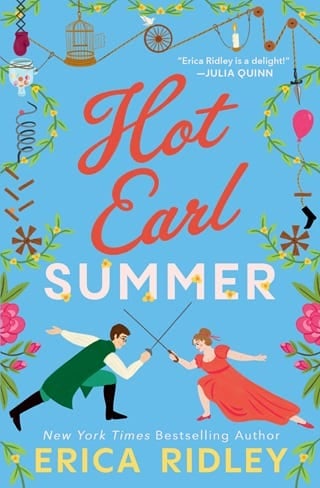3
T he Earl of Densmore's very much alive hands… were nowhere near his mother's old castle.
Where, precisely, the earl's hands—and the rest of him—might be was a question Stephen Lenox would love to know the answer to. He'd run his lordship through with a blade himself for putting him in this damnable situation.
Cover for me , his favorite, if feckless, cousin had said. I'll be gone for a few nights at the most. All you have to do is pretend to be me. It'll be easy! You're next in line to the title anyway. Just collect my correspondence, don't let anyone in the door, and I'll be back before you know it.
The earl had not come back. Stephen was beginning to suspect he never would.
Castle Harbrook was now his prison.
Therefore, Stephen had taken it upon himself to fill the days with as many distractions as possible. This far from London, he did not have access to his workroom at home, but that did not prevent him from turning his cousin's castle into a makeshift temporary laboratory.
Stephen stood in the dungeon at the rear of the castle. An old trapdoor, positioned above his head, hadn't been used in centuries. Over time, the door had been covered with soil and seedlings. Stephen had unearthed the portal out of boredom, his first week here. It was now wide open.
Sunlight streamed into the dungeon below. Footmen clamored around the opening, taking delivery of Stephen's latest purchases as rapidly as possible.
They had to be quick, because Stephen did not wish to be seen. Not because the ruse might fall apart. He and his cousin favored each other enough to easily be mistaken for brothers. Stephen was not worried about some Grand Unmasking. He worried about passing convincingly enough that someone would shoot an arrow through his heart.
Richard Reddington had threatened to do just that. And since more than one of his known prior enemies had disappeared without a trace…
"That's the last of the deliveries," said the butler, McCarthy.
Once the servants had gone, Stephen closed the trapdoor. After exiting the dungeon, he secured the interior door separating the underground chamber from the rest of the castle. This lock could only be opened from inside the residential part of the castle. Meaning anyone unlucky enough to sneak in through the trapdoor would find themselves trapped inside the dungeon for good. The last thing anyone needed was for one of the employees to be stuck inside.
Out in the passageway, the footmen did not tarry. They had already formed a queue and were passing Stephen's crates up the stairs to the medieval Great Hall, where Stephen had set up his work area.
He was not used to so many servants. Though in this old pile, he very much appreciated their assistance. Stephen helped carry the heavy objects upstairs, but taking on all that labor by himself would have caused an untenable delay in the current project underway.
On the main floor, Mrs. Hennessy, the housekeeper, arched her gray brows. "Have you considered receiving something normal ?"
Like what? Mashed peas? New cravats? Visits from friends or paramours?
Stephen didn't know enough about fashion to mind that he didn't have any. The same went for other people. Romantic relationships lasting longer than one night weren't worth the bother. He was a recluse and liked it that way. In fact, he had spent decades keeping people out . Even at home, the only time he stepped out of doors was to receive a delivery like this one.
If only Stephen weren't so fond of his disarmingly charming, unabashedly useless cousin, he wouldn't be in this pickle.
Stephen did not understand other people, and other people tended not to understand him, but the Earl of Densmore… There was an easy fellow to fathom. Densmore liked exactly two things: fine wine and a good wager, not necessarily in that order. The probability that the earl had forgotten about his cousin entirely and was off in his cups in some gaming hell was approximately 0.9854, which was damn near mathematical certainty.
That was the sort of thing Stephen understood. Facts, figures, mathematics, science, machines. Things he could puzzle out with logic. Things he could put his hands on and touch.
The butler slapped the latest stack of correspondence into Stephen's hands.
"Are you certain you don't want me at the front door?" McCarthy asked, his eyes pleading.
"It's impossible to enter that way," Stephen reminded him.
"It wouldn't have to be," McCarthy grumbled, "if it weren't for your… renovations."
"And I have not finished my improvements," Stephen informed him. "I will continue until the rightful Earl of Densmore returns and my life is no longer at risk."
Stephen strode to the Great Hall. The enormous room could host a party fit for the Queen. Not that Stephen would ever host a party. He didn't even host tea. At home, he employed exactly one maid and exactly one manservant. Who, like Stephen, had expected him to return in a few days, not months.
"The new crates have been stacked next to the previous ones," reported a footman. "Will there be anything else, my lord?"
"I'm not your lord," Stephen reminded him.
"You said to pretend until the earl returns."
"I said to do so in the presence of witnesses who might otherwise—" Stephen cut himself off. The footman was apparently teasing him. At least the staff still had a sense of humor. "Thank you. That will be all."
The footmen filed out of the Great Hall. A few of them glanced askance at the mathematical equations scrawled over every inch of the gray stone walls in bright white chalk.
Yes, that was what Stephen needed. More chalk. It ought to be in one of the new crates.
He headed over to rummage through the boxes, tossing the stack of unread correspondence atop one of the piles while he searched.
The walls were covered in chalk equations, and the perimeter was lined with wooden crates. But the interior of the enormous salon—that was where the magic took place.
Not literally, of course. Magic did not exist. Only machines, which could be designed to perform tasks that seemed like magic.
Stephen's inventions, in various stages of completion, filled the castle. They were his companions, his friends, his family. Most of the time, he didn't need anything or anyone else. Machines were better than people. They could be counted upon to do exactly the thing you expected them to do, with no surprises or misunderstandings.
If Stephen did occasionally crave connection with others, he achieved it through science and mathematics. The farmers using the all-weather irrigator or the mechanical poultry feeder would never know their modern conveniences were thanks to Stephen Lenox. It didn't matter. He was useful, and his efforts were important in their lives whether they realized it or not.
"Aha!" Triumphant, Stephen pulled a fresh stick of chalk from a newly opened box. He tucked the white stick carefully into the lined inner pocket he'd had sewn into all his waistcoats for just this purpose.
Now he could attend to his cousin's latest correspondence.
Stephen carried the letters to the table he'd placed at the center of the four largest machines in the Great Hall. He supposed he could have commissioned a nice, heavy desk, but Stephen liked to keep things light and movable, when possible. He settled himself in the single, padded, high-back chair.
"I suppose some portion of these letters shall require a response of some type," he said aloud to the cavernous room. "Which means I shall require a plume."
He pulled the third of four levers attached to the table.
The slight action of having pulled the lever caused a slack rope to tighten. The rope stretched to the tall ceiling, slipped through a metal hoop screwed into the stone, and traveled several feet before terminating in a knot.
The knot was attached to the metal handle of a wooden pail. The sharp motion of the rope upset the balance of the full pail, and a gallon of water poured straight down into a basin perched atop a seesaw mechanism installed high above Stephen's head. As the basin filled with water, its side of the seesaw sank in a rush.
The opposite side of the seesaw therefore thrust upward—launching a fat red marble into the air, where it landed on the outermost edge of a long pipe cut in half lengthwise. The marble zigzagged along the floating metal track, until it shot out of the final opening and crashed into the back of a ragdoll.
The doll tumbled from its precarious perch and landed on a battledore racket, the netting of which slapped down as the corresponding handle shot up. This handle was attached to a string that knocked a rubber mallet against the first in a long row of dangling glass vials.
Each of the transparent cylinders banged against the next in turn, the varying levels of water inside causing a recognizable melody to the sound. Stephen had chosen a popular reel for the tune. He was not one for dancing—such steps usually required a partner—but he did enjoy music, and thought a few bars of a Scottish reel added a sophisticated touch.
The final glass vial swung into a hook, which engaged a pulley, which pulled a wire, which activated a funnel, which released a sack of pebbles, which traveled down a tube, which led to a book, which fell against the rear of a small wooden horse on wheels, which rolled until its muzzle hit a button, which opened a hatch, from which tumbled a boot, which fell atop a cushion, which nudged a teacup, which spun into a domino… that had been placed in a long, snaking line of its brethren.
Each domino banged into its neighbor in quick succession, a rather melodious rat-a-tat-tat as the ivories clinked against each other faster and faster around a wide wheel suspended horizontally above Stephen's head. The fall of the final domino caused an infinitesimal gust of air, too small to be detected from where Stephen sat below, but just strong enough to knock a whisper-light feather free from its perch.
Thanks to a small weight attached to its nib, the feather fell slowly, lightly, tipping this way and that in its graceful descent until it landed at last in the center of Stephen's upturned palm.
"There," he said with satisfaction. "Much better. Now we can begin."
He retrieved a knife from his pocket and began shaping the tip of his new plume.
Yes, of course there was a simpler way to retrieve a feather. But who said simpler was better? Stephen abhorred being bored and prevented such an atrocity from ever occurring by applying himself to chalking theorems and resetting machines while he waited on deliveries of the materials needed for his next inventions.
And now, correspondence.
As usual, the majority of today's batch of correspondence was from Richard Reddington, Reddington's man of business, Reddington's lawyer, Reddington's other lawyer, and Reddington's other lawyer.
Stephen would not be putting in any Court of Chancery appearances in his cousin's name—he rarely stepped out of doors at all, except in the pursuit of pistachio ices—so he placed the legal inquiries to one side. Later, he would insert the documents in a machine that would raise them up to Densmore's study to be filed with the others.
He did, however, read the latest personal threat from Reddington.
The war enthusiast's vast country estate abutted the eastern border of Castle Harbrook. Only a strip of dense woods separated the two properties, half belonging to each of them. Well, it belonged to Reddington's father, anyway. But the viscount rarely left London, which put control of the country estate fully in Richard Reddington's hands.
This proximity to Castle Harbrook was the reason Reddington positively foamed at the mouth to take possession. He could not bear to live in the shadow of a castle that did not belong to him. And it would be the perfect site for Reddington's upcoming reenactment of the battle of Waterloo. He inundated the "earl" with missives alternatively demanding legal action, or felonious imprisonment, or demanding satisfaction at dawn in a duel to the death.
"I politely decline," Stephen murmured. "Yet again."
He had never shot a pistol, and did not intend to take a bullet for his cousin. Stephen could be talked into creating a remotely detonated projectile-firing machine, but it would most likely be too unwieldy to take to a clandestine clearing for a duel of honor.
What Stephen really wanted was to go home. He wished he hadn't given his word to guard the castle until Densmore returned. In an abundance of caution, Stephen had taken it upon himself to reinforce the security of the entrance to the castle.
"‘Choose your seconds,'" he read aloud from the latest missive. "‘This is not an invitation. It is a command. Hand over the castle as promised, or prepare your dueling pistol.'"
Stephen rolled his eyes. He didn't have a "second." He was a recluse . If he were forced to name a cohort, the only person he'd be able to come up with would be his cousin, the Earl of Densmore. And if Stephen knew where to find that roguish scamp, he wouldn't be in this position to begin with.
He tossed the letter onto the pile without responding. Reddington was Densmore's problem, not Stephen's.
For now.
 Fullepub
Fullepub 



